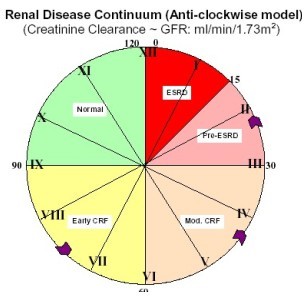More Symptoms

 When GFR levels decline to a certain degree, dialysis or kidney transplant will be recommended to help save patients’ lives in many countries. And how to improve GFR levels effectively becomes the key to avoid dialysis and kidney transplant.
When GFR levels decline to a certain degree, dialysis or kidney transplant will be recommended to help save patients’ lives in many countries. And how to improve GFR levels effectively becomes the key to avoid dialysis and kidney transplant.
What is GFR?
GFR (Glomerular Filtration Rate) is the best test to measure your level of kidney function and determine your stage of kidney disease. Your doctor can calculate it from the results of your blood creatinine test, your age, race, gender and other factors. The earlier kidney disease is detected, the better the chance of slowing or stopping its progression.
What are the normal ranges?
GFR levels can be classified as follows:
-Normal: 100-140mls/min,
-Mild Kidney Failure<90mls/min,
-Moderate Kidney Failure<60mls/min,
-Severe Kidney Failure<30mls/min, and
-End-stage Kidney Failure<15mls/min.
Your GFR will naturally decrease by 0.5-1ml/min as a part of the normal ageing process. For example, a healthy 60-70 year-old will have a GFR of 60-70 mls/min (half their young adult normal).
Management and further investigation of low GFR
If you are found to have a decreased GFR level, the doctor may ask you some more questions, perform a clinical examination and certain investigations to work out the underlying cause of your abnormal result.
-Have there been any causes of insults to the kidneys? Like have you been taking any new medications, have you been sick or dehydrated and vomiting?
-If the kidneys are not functioning optimally, there may be some complications that can occur, such as swelling of the ankles, difficulty breathing, excessive lethargy, confusion or abnormalities in heart beat.
-Your doctor may choose to carry out some further investigations like blood tests and urine test.
-Imaging of the kidneys through procedures such as an ultrasound test. This can provide an idea of the size of the kidneys, how your urinary tract looks and whether there is any obstruction present.
Some drugs depend on the kidneys to be excreted from the body. These medications should all be monitored closely and adjusted as necessary. Medications that are known to be toxic to the kidney should be avoided.
-Lifestyle factors that contribute to your risk of disease of the heart and major blood vessels should be identified and optimised. These include quitting smoking, adhering to a healthy diet low in fats and salts, limiting alcohol consumption and regular exercise. Your local doctor may start some blood pressure medications that can be beneficial to your kidneys.
How to improve GFR levels?
The best way to improve GFR levels is to save kidneys by repairing kidney damage and recovering kidney function. Nowadays, Micro-Chinese Medicine Osmotherapy, Immunotherapy and Blood Pollution Therapy are commonly used in clinic to help improve GFR levels. If you are interested in them, you can leave us a message below or directly consult Live Doctor freely.
Ready for the next step? Learn more about treatment options for kidney disease symptoms.